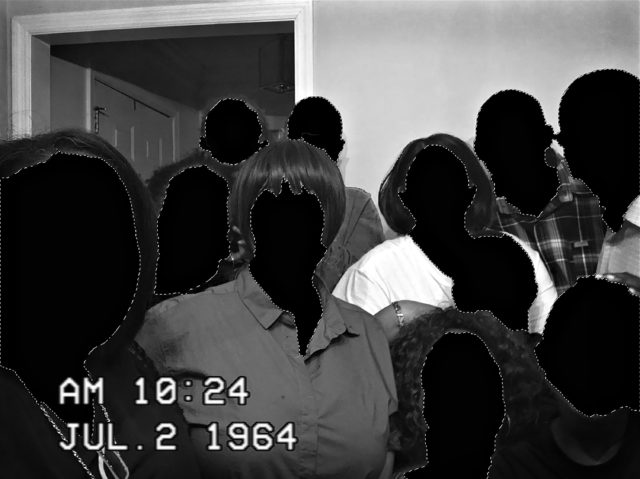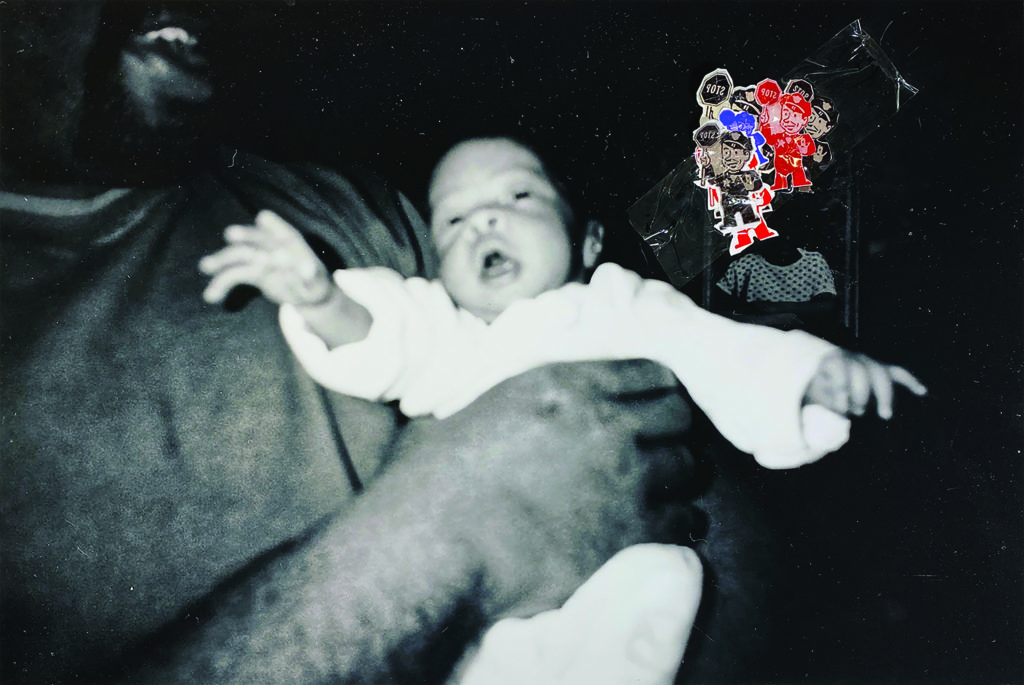
By the spring of 2020, André Ramos-Woodard (they/them) was mad as hell.
It started with Ahmaud Arbery, chased and gunned down by white men while running in his own neighborhood. Then Breonna Taylor, shot in her own home during a misfired police raid. Then George Floyd, asphyxiated under the weight of a police officer’s knee.
“I have never been so, like, communally and personally attacked [than I was] by what was going on that year; I’m still so fucking mad,” Ramos-Woodard says from their home in Texas. “Not only was all this shit happening to Black people, we were stuck at home. It was hard to even go outside, interact with people in a genuine way and get these kinds of feelings out . . . so I made a lot of pieces that felt like punching a wall.”
Ramos-Woodard’s work from this period, collectively titled AFRICAN-AMERICA: Contempt of Greasy Pigs, will launch the opening of the new east window SOUTH gallery at 4949 Broadway. More than a dozen pieces capture the non-binary Black multimedia artist’s rage, confusion, and sadness during the year 2020, from collage photography to performance pieces to a digital ’zine.
“I was looking into police jargon and found the term ‘contempt of cop,’ which is a phrase police use when they are talking to each other when someone—a ‘civilian’ or whoever—disrespects them, whether that’s flicking them off or attacking them,” Ramos-Woodard says of the title. “So I’m taking the language they use and I’m slapping them in the face with it . . . I want people to know in the title that there is no respect for this prison industrial complex. I want people to know that I’m angry. Black people in this country have to live a very specific lifestyle or be pressed down because of pigs, because of ‘authority,’ because of the prison industrial complex, because of the government. I need people to know that I’m not happy about it, and Black people shouldn’t be happy about it, and people in general should not be happy about it.”
Ramos-Woodard first showcased their work in Colorado at a photography exhibition in Denver curated by Mark Sink, founder of the Mile High City’s Month of Photography. That collection, uncomfortably titled a mediocre-ass n***a, was particularly personal for Ramos-Woodard, addressing their experience with anxiety and depression.
“I absolutely think that I’m a pretty mediocre person,” Ramos-Woodard says, laughing. “That body of work actually started after my first year of graduate school. That was the first time I was dealing with my mental health. Growing up, I kind of just pushed it to the side, ignored it. So that collection was me really dealing with those thoughts and those feelings through my art.”
The Texas-based artist’s sobering collages of media images of violence against Black bodies mixed with playful family photos caught the eye of Boulder artist and east window founder Todd Herman, who firmly disagrees with Ramos-Woodard’s sense of mediocrity.
“[They’re] a strong enough artist to go there and know that that is, as they say, their reality,” Herman said of Ramos-Woodard’s work during an interview in November. “Even though they’re appropriating these media images, and they’re laying these other images over, they’re not softening [the impact of] the image. They’re creating historical context. This might not be what people want to see, but they’re not afraid to go there and show Black bodies, wounded, in pain, dead. They’re super intelligent with juxtapositions and what they’re provoking in the dialogue during and after the show, and I just really respect that they go full-on and do all of this.”

In one work on display in “Contempt of Greasy Pigs,” Ramos-Woodard evokes the cover image of The Roots’ 1999 album Things Fall Apart, a black and white image of Black protesters in the 1960s running from white police officers.
In Ramos-Woodard’s take, a picture of them as an infant in their father’s arms has cartoonish stamps of a police officer with a stop sign superimposed over the baby’s head, arms outstretched as though trying to run away—perhaps from their future.
In a video piece called “Haulin’ Ass,” Ramos-Woodard runs until they nearly throw up. The title comes from Greg McMichael—one of Arbery’s murderers—who claimed Arbery was “hauling ass” past the white man’s home the day McMichael and his son chased Arbery down and shot him.
“[Ahmaud Arbery] was only ‘haulin’ ass’ because people were chasing him with a goddamn gun,” Ramos-Woodard says. “So I hauled ass. I ran so hard, to the point of, like, throwing up. I wanted to mimic what it was like to run for your life.”
In “My Fellow Americans,” a group of white people stand around the charred body of a Black man with the words “My fellow Americans” superimposed in blood red. In “Let Freedom Ring,” spectators stare at Mike Brown’s body as it was left in the street of Ferguson for four hours.
But the most critical piece, in Ramos-Woodard’s mind, is “Know Your Rights,” a digital zine patrons can access via a QR code that tells people their rights when interacting with police officers.
“Cops often overstep their boundaries because they don’t think that people know their rights,” Ramos-Woodard says. “I think it’s really important that when people go to the show, that they take that work with them, because we’re not taught about our rights against the police in school, because the police are supposed to help us in all these ways, but they don’t. They just don’t.”














